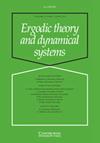Subshifts of finite symbolic rank
IF 0.8
3区 数学
Q2 MATHEMATICS
引用次数: 0
Abstract
The definition of subshifts of finite symbolic rank is motivated by the finite rank measure-preserving transformations which have been extensively studied in ergodic theory. In this paper, we study subshifts of finite symbolic rank as essentially minimal Cantor systems. We show that minimal subshifts of finite symbolic rank have finite topological rank, and conversely, every minimal Cantor system of finite topological rank is either an odometer or conjugate to a minimal subshift of finite symbolic rank. We characterize the class of all minimal Cantor systems conjugate to a rank-有限符号等级的子移位
有限符号秩子转移的定义是受有限秩保量变换的启发,而有限秩保量变换在遍历理论中已被广泛研究。在本文中,我们将有限符号秩的子移动本质上视为最小康托尔系统来研究。我们证明了有限符号秩的最小子移位具有有限拓扑秩,反过来说,每个有限拓扑秩的最小康托尔系统要么是有限符号秩的最小子移位的里程表,要么是其共轭。我们描述了与秩-1$子移位共轭的所有极小康托尔系统的类别,并证明它在所有极小康托尔系统的波兰空间中是密集的,但不是泛函的。在一些不同的子移位波兰编码空间中,我们也证明了秩-1 子移位是致密的,但不是泛函。最后,我们研究了有限符号秩的最小子转移的拓扑因子。我们证明了每一个无限里程表和每一个无理旋转都是符号秩为 2$ 的最小子移位的最大等连续因子,并且有限符号秩的最小子移位的子移位因子具有有限符号秩。
本文章由计算机程序翻译,如有差异,请以英文原文为准。
求助全文
约1分钟内获得全文
求助全文
来源期刊
CiteScore
1.70
自引率
11.10%
发文量
113
审稿时长
6-12 weeks
期刊介绍:
Ergodic Theory and Dynamical Systems focuses on a rich variety of research areas which, although diverse, employ as common themes global dynamical methods. The journal provides a focus for this important and flourishing area of mathematics and brings together many major contributions in the field. The journal acts as a forum for central problems of dynamical systems and of interactions of dynamical systems with areas such as differential geometry, number theory, operator algebras, celestial and statistical mechanics, and biology.

 求助内容:
求助内容: 应助结果提醒方式:
应助结果提醒方式:


